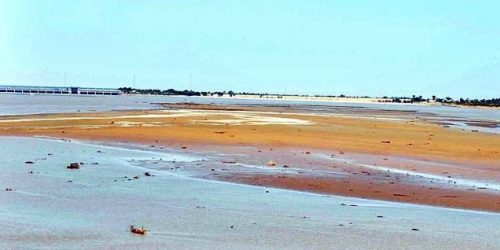HYDERABAD:
Although blessed with the Indus River, lakes, mountain streams and subsoil water, Sindh and its people continue to face myriads of water-related problems, ranging from shortage of water supply to contamination.
Keeping this in view, the provincial government embarked upon the gigantic task of formulating an all-encompassing water policy, covering urban to rural water supply and drainage, over three years ago.
However, questions still remain as to how comprehensive and enforceable the policy is going to be as a team of experts collects suggestions and ideas with the stated aim of incorporating them in the policy. In this regard a consultative session with the field journalists was held in Hyderabad at the office of Sindh Irrigation and Drainage Authority (SIDA) on Thursday.
The experts drafting the policy, including Netherland-based Dr Frank Van Steenburgen, Dr Bakshal Lashari and Dr Hemandas Lohano, answered queries and concerns – some articulately and others vaguely – while also noting the recommendations.
Steenburgen briefed that the policy will comprise six basic and broad features including management of water, canals and drainage system, dry land, wetlands, urban and rural water supply. “This document will offer guidelines for supplying water for agricultural, industrial and domestic consumption to urban and rural areas of the province.”
During the session, journalist GN Mughal lamented that the government continued to ignore the serious and life threatening issue of contamination of waterways by industrial effluent and discharge of domestic wastewater. Responding to Mughal’s comment, Dr Lashari said that they are considering setting up a separate wastewater commission to regulate the discharge of effluent and wastewater.
Meanwhile, journalist Ishaq Mangrio pointed out that hundreds of villages where the people have been dwelling for centuries have been deprived of their water supply due to Darawat and Naigaj dams. The dams are fed by the streams of rainwater flowing from the Kirthar Mountains.
Also read: Protests erupt over water shortages across Sindh
“The only source of water for these people were the seasonal streams whose supply has been cut off.”
Another journalist, Sabeena Faraz, deplored that the Indus Delta has been destroyed due to wrong governmental policies besides factors like climate change and sea intrusion.
Dr Lashari acknowledged that supply of water which is meant for agriculture purposes to private fish farms, which exist in thousands of numbers in the province, continues to be unregulated.
He assured that their team will add the issue in the policy and water charges will be fixed for the fish ponds.
On the crucial issue of commercialization of drinking water amid supply of unclean drinking water by Sindh government’s water filtration plants across the province, Dr Lohano made a vague reply but agreed with the questioner that a regulatory framework is required to monitor the private companies selling drinking water.
Journalist Muhammad Hussain Khan pointed out that there is no provision in the existing laws for supply of water to private drinking water companies.
Responding to queries, Dr Lohano said that they would recommend to the Sindh government to provide all the required powers to the water commission so that it could regulate the water supply and drainage systems.
Some participants also emphasized on the need of revisiting the 1991 water accord arguing that the Centre and Punjab were already violating the accord.
Dr Lashari apprised that the Food and Agriculture Organisation in concert with the local experts representing the Sindh government are carrying out the process of creating crop zones in the province. He added that the water commission will also regulate the crop zoning.
Meanwhile, SIDA Chairperson Abdul Basit Soomro informed that SIDA will receive administrative control of three more canals on the right bank of Indus River. According to him, only five per cent of the river water is utilised by the industrial and domestic consumers while 95 per cent is used for irrigation purposes.





